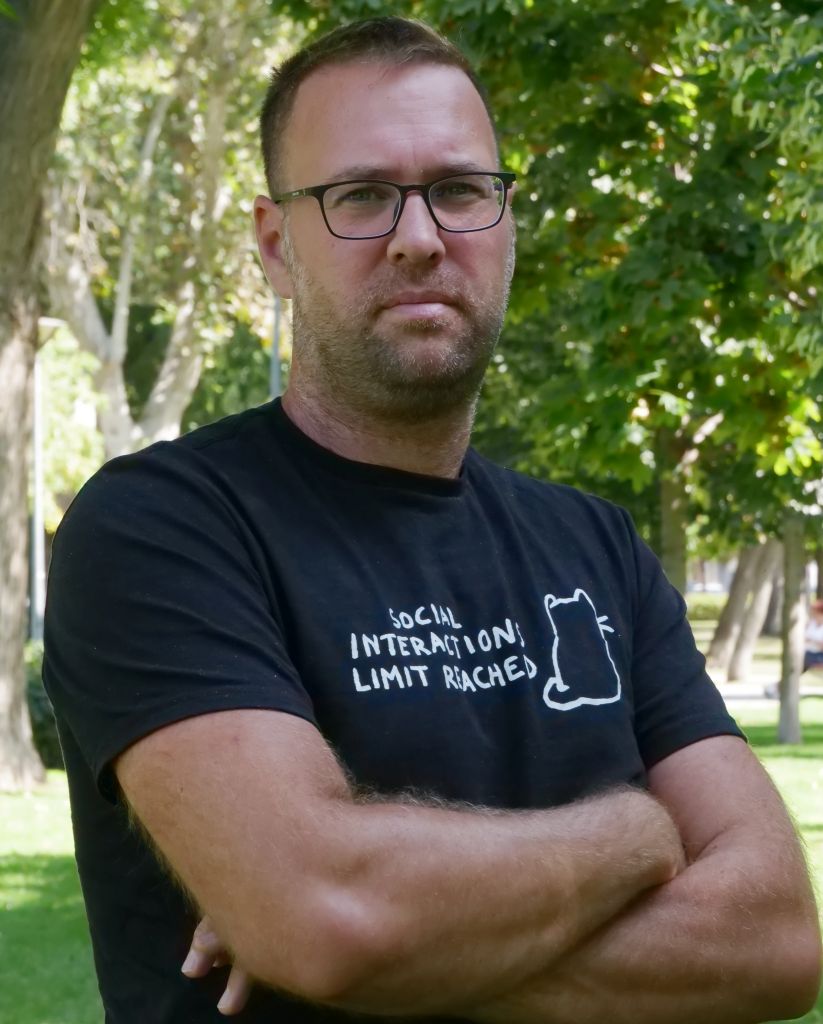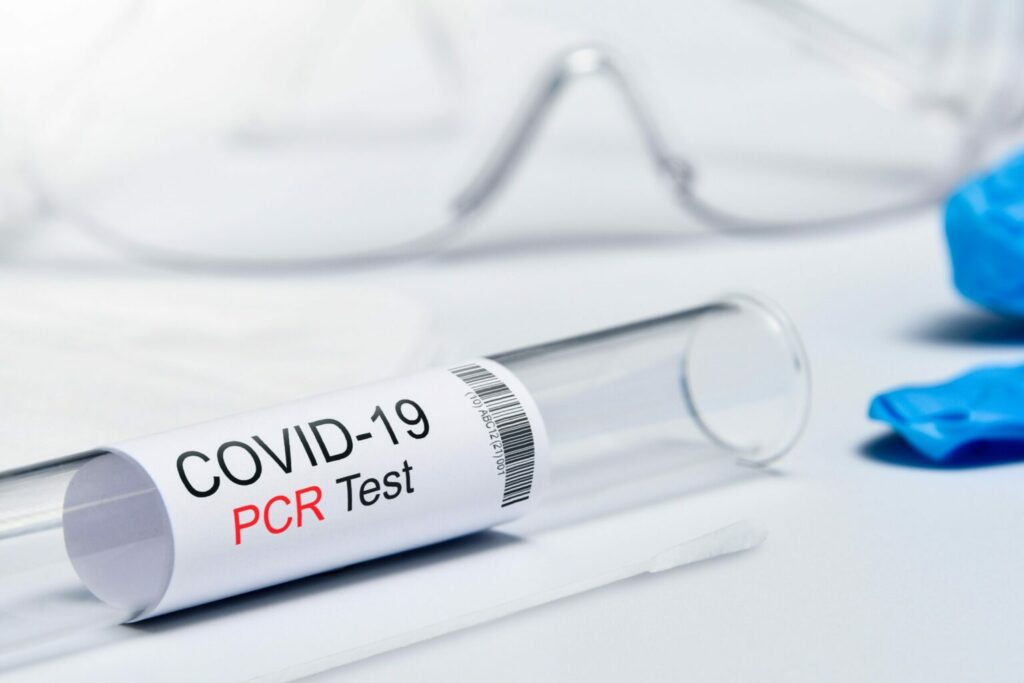The https://english.atlatszo.hu use cookies to track and profile customers such as action tags and pixel tracking on our website to assist our marketing. On our website we use technical, analytical, marketing and preference cookies. These are necessary for our site to work properly and to give us inforamation about how our site is used. See Cookies Policy
The National Blood Service bought PCR tests for billions during the pandemic, a private company made a huge profit
The National Blood Service (OVSZ) was exempt from public procurement when it contracted companies to “procure equipment and services for testing, sampling, and analysis for SARS-CoV-2 examinations” for HUF 18.2 billion during the epidemic, according to data obtained by K-Monitor from the Ministry of Interior. Átlátszó requested the contract in a public data request, to which the director of the OVSZ Dr Andrea Matusovits Bayerné responded after 30 days: “The contract cannot be identified beyond reasonable doubt” – therefore, they could not release it. We helped them identify it.
April 9, 2021. It was the height of the pandemic. People were sick and scared and isolated. Prime Minister Viktor Orbán took to the waves of Kossuth Radio to issue a rallying cry – get vaccinated. According to the COVID-19 monitor, there were over 11,000 hospital inpatients. Around 1,364 were on ventilators. The virus was at its rampant peak.

On the same day, the OVSZ, headed by Dr Andrea Matusovits Bayerné – the wife of the infamously abrasive pro-government publicist Zsolt Bayer – signed a contract with Vascular Venture Ltd for PCR tests. The HUF 18.2 billion was part of the HUF 722 billion spent by the government without public procurement during the pandemic.
The curious case of the non-contract
The OVSZ awarded a contract for 1 million PCR tests at a net price of HUF 16,280 per test and a total net price of HUF 16.28 billion (a gross HUF17.1 billion).
K-Monitor sued the Ministry of the Interior for the information after the OVSZ could not initially find the document in response to our public data request. When OVSZ finally managed to send the contracts – each company’s contract separately – the documents showed that much of the HUF 18.2 billion is connected to Vascular Venture Ltd.
In addition to PCR tests, OVSZ also purchased “1,100,000 sample tubes for performing SARS-CoV-2 PCR tests and 1,100,000 sampling sticks for performing SARS-CoV-2 PCR tests” from Vascular for a net amount of HUF 463.2 million.
Construction company Centrál-Bau Hungária Kft was tasked with packaging – they assembled the units at a price of HUF 40 + 27% VAT.
An April 2021 penzcentrum.hu article did a country-wide PCR test price comparison. “Looking through the price list of Hungarian private laboratories, we can see that PCR tests are still available at the official price of HUF 19 500 in most places. Of course, there are exceptions: at Dimenzió-Med Health Centre and InspiroMed we can find PCR tests for 18,000 HUF, at Emineo for 17,900 HUF, at Budai Private Medical Centre for 17,500 HUF, and at Swiss Medical now on special offer for 16,500 HUF,” they wrote.
OVSZ performed the tests for around a gross 17,630 HUF. Apparently, the HUF 18 billion contract did not give leeway for much of a discount. PCR tests are nowadays available at a much lower price of 9,500 forints.
State-funded PCR tests
The entry is still available today on kormany.hu: “To speed up the diagnosis of suspected COVID patients and streamline patient pathways, we have equipped all ambulances with rapid antigen tests. Prior to this, the National Centre for Public Health carried out a comparative clinical trial of antigen-based rapid tests with PCR tests to speed up diagnosis. The aim was to select the antigen-based rapid tests that best match the PCR tests. The tests selected have a very good specificity of between 99-100%, which means that in case of a positive result, it is an acceptable diagnosis.”
The October 2020 announcement, made before the HUF 18.2 billion contract, points out that “this new procedure will significantly shorten the wait times for treatment for moderate and severe COVID-positive patients by several days, because there is no need to wait for the result of the PCR test.”
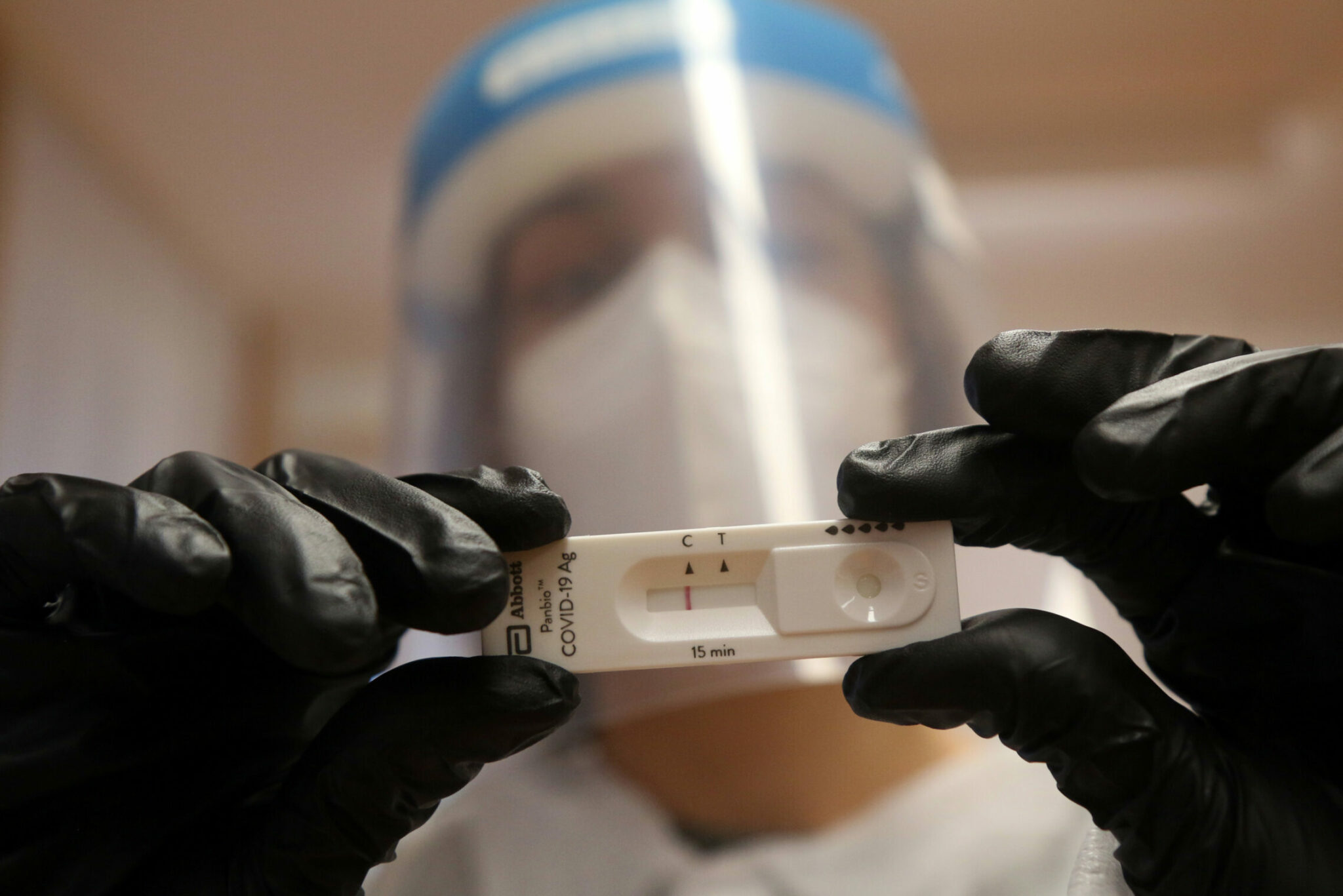
Photo: Anna Mészáros, a University of Miskolc physiotherapy student, shows a negative coronavirus antigen test at the Zrínyi Ilona Primary School in Encs on December 2, 2020.
The government’s communication showed the confusion around PCR tests. In August 2021, it was announced that PCR testing would no longer be publicly funded.
The government wrote: “Since all Hungarian citizens can get the coronavirus vaccine for free, there is no justification for the Hungarian taxpayers to pay for PCR tests for patients facing deferable surgeries who need the test solely because they did not take advantage of the vaccination of their own free will. There may be a number of exceptions to this rule.”
But, the announcement was released when there were still four months left of the OVSZ contract – which means that some of the tests ordered by the OVSZ were paid for by the taxpayers.
In 2023, G7 tried to ascertain who exactly won the public money testing. They wrote: “A common criticism in the handling of the coronavirus outbreak was that too few tests were carried out in Hungary. Indeed, international comparisons reflect this: we rank 59th out of 145 countries ranked. Hungary tested the lowest compared to both developed countries and to other countries in the Central and Eastern European region.”
They added: “After lengthy public interest data requests, state actors claim that Hungarian health funding paid out just under HUF 5.5 billion in 2020-2021 to finance PCR testing. Contracts can be found in the records of the National Centre for Public Health (NNK), while the National Health Insurance Fund Management (NEAK) claims that they did not fund any PCR testing at all.”
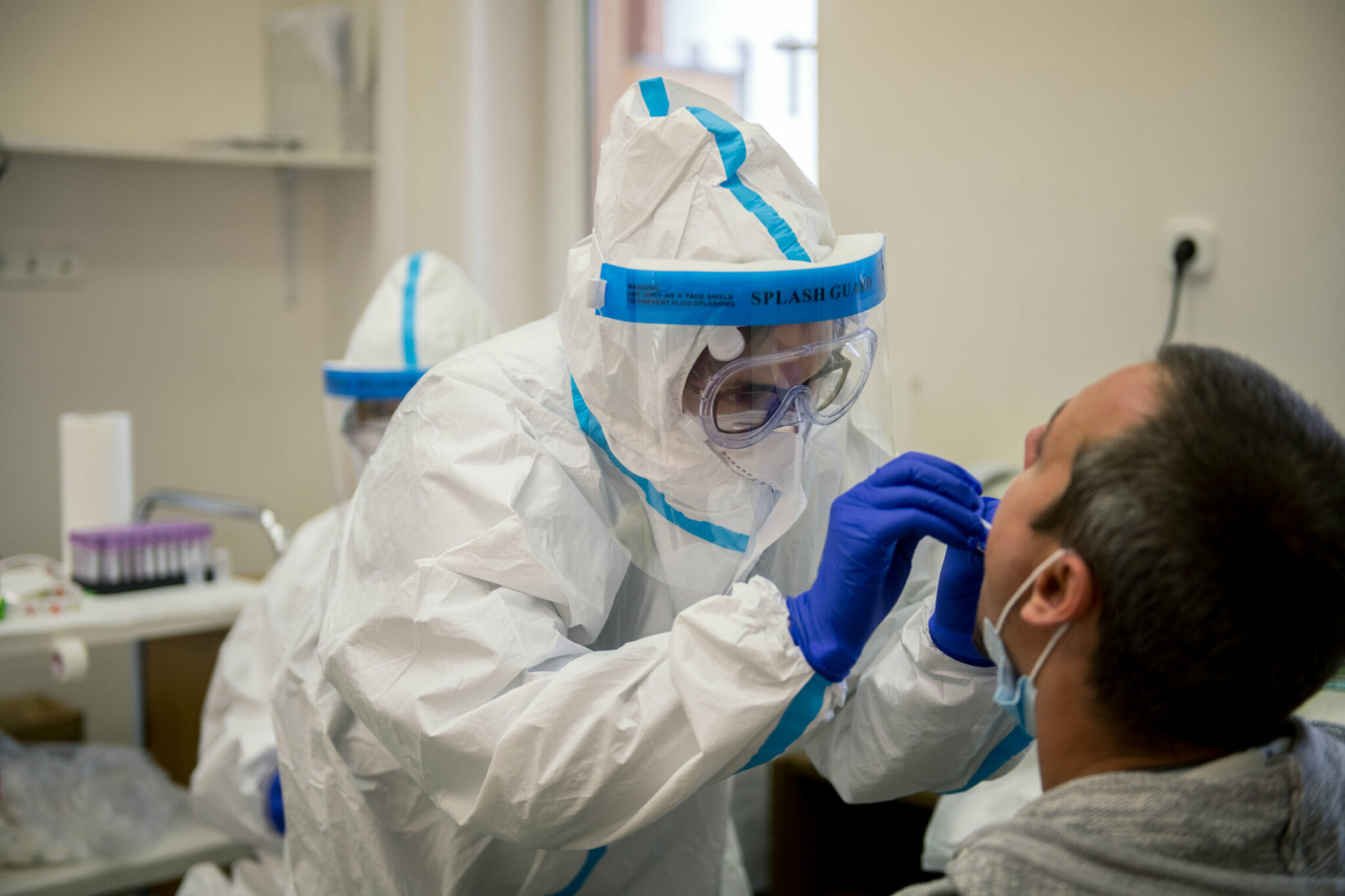
Photo: A sample is taken from a man at the clinic for Coronavirus screening at Mohács Hospital on May 12, 2020. (photo: MTI/Tamás Sóki).
Based on the decision of the Hungarian government’s Operative Group
Our article makes it clear: the amount the state spent is in the eye of the beholder. Indeed, the state spent much more than HUF 5.5 billion on PCR tests – but the contracts were not done by hospital supervisor NEAK or the epidemic management organization NNK.
Instead, and for reasons unknown, the exercise was done by the OVSZ – who, with less than a quarter of a million blood donors a year, probably did not actually need one million PCR tests.
We asked the Blood Service what the tests were used for – this is the answer we received: “Based on the decision reached by the Operative Group and the written directive of the then-National Centre for Public Health (now the National Centre for Public Health and Pharmacies), the Blood Service carried out PCR testing of samples taken typically by the National Ambulance Services and healthcare institutions managed by the National Directorate General of Hospitals. The National Blood Service has performed its tasks beyond its core activities to the highest possible standard, contributing to the fight against the coronavirus epidemic.”
The rapid test has been used in ambulances since autumn 2020 – but the partner contracted by the OVSZ completed testing at a considerable and unnecessary cost, using public money.
And PCR tests can show false-positive results. Szeged research doctor Tamás Letoha published recently: “The PCR testing that led to the COVID outbreak was the world’s most ingenious hoax – the mucus layer protecting the surface of the airways can detect many pathogens in anyone at any time.” He has criticised the management of the epidemic, the government closures and the way in which the disease was being controlled repeatedly. “Just because someone is PCR-positive does not mean that they are infected,” he said. “The mucociliary protective function of the airways works on the same principle as the doormat, which prevents dirt stuck to the floor from entering the building. Symptom-free infestation is nothing more than declaring a building infested based on the contaminants found on the doormats.”
The link between Mrs Bayer and the winning company
In 2020, Válasz Online reported that the director general of the OVSZ, Dr Andrea Bayerné Matusovits, and the former owners of Vascular Plazma Kft – one of the winners of the state blood plasma tender – studied at the same medical faculty in Szeged.
Vascular Venture Ltd., the winner of the PCR testing contract, was owned by the same doctors from Szeged. The basis for their selection remains unknown.
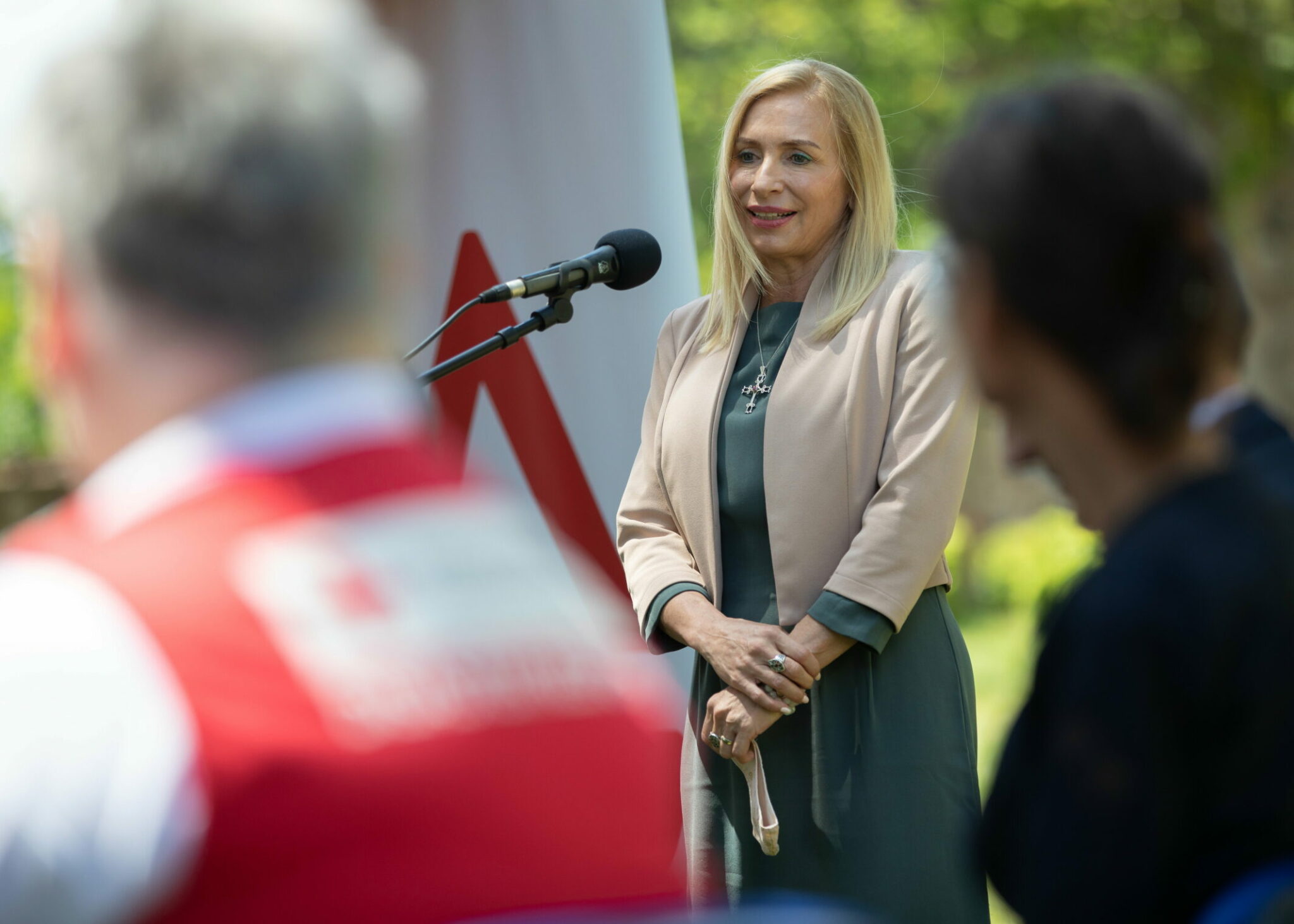
Photo: Andrea Bayerné Matusovits, Director General of the National Blood Service, speaks at the press conference of the Hungarian Red Cross on the World Blood Donors’ Day at the Esztergom Town Hall on 14 June 2021 (photo: MTI/Balázs Mohai).
In 2021, the year of the contract, Vascular Venture Ltd. had net sales of almost HUF 34 billion – a HUF 23 billion increase from the previous year.
According to their annex, the company’s profit after tax jumped to HUF 11.3 billion from HUF 830 million.
Most of the HUF 11 billion profit was taken out of the company. “Of the profit after tax for the current year, HUF 9 billion will be approved as dividends, and the remaining amount will be transferred to the profit reserve.”
Some people struggled during the pandemic. Arguably, it was not a good time to be had. Other people struggled less, and some people – a rare few talented individuals – profited.
Translated by Vanda Mayer. The original, Hungarian version of this story was written by Csaba Segesvári and can be found here.
